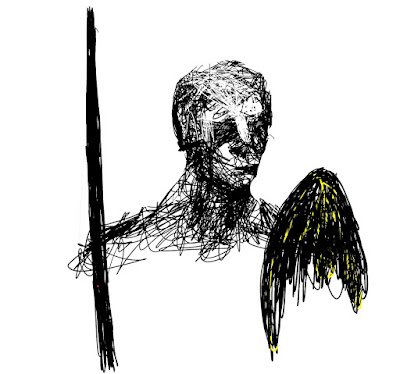Differences between depression and burnout (part 3 of 3)
part 3 of 3
Christina Maslach, who led the contemporary charge at burnout, said it had many presentations but in her view had 3 defining characteristics. These were exhaustion, cynicism, and loss of efficacy. (Efficacy by itself might be vague, but I think of it as a lost ability, not just felt by the one losing it, but also noticed by others.) There are parallels between these 3 defining criteria and the multiple criteria of depression. Difficulty concentrating, or changes in appetite or sleep, or psychomotor agitation or retardation, have a parallel in the loss of efficacy. Perhaps concentration, and efficacy, are not so different. And exhaustion and fatigue, if they were steps of gray, must be dark light gray and light dark gray, on a continuum even if not the same color.
But “feelings of worthlessness or excessive or inappropriate guilt,” seem to me quite different from cynicism. Not explicit in the above definition of depression, but understood, is that the “feelings of worthlessness” are not directed at any institution, but at oneself. Paradoxically, if there is a difference between the dark light gray of burnout, and the dark dark gray of depression, it may be in burnout there is dark light of cynicism, directed against others.
Cynicism, named for various and disputed reasons because of its associations with a dog, has changed in meaning. Diogenes, living in a bathtub, appeared to relish his appellation of dog, and he and his followers reveled in not needing conventional trappings. Not many women cynics going about in the nude: this philosophy appears to have been yet another privilege of ancient Greek men. These men said their virtue brought happiness, and said unlike their counterparts, they saw life clearly, without smoke clouding their judgment. In Greek, smoke (τύφος) could be blown away and made smoke-free by preceding the Greek word with an alpha, which indicated its absence (ἁτυφια), and for ancient cynics to be smoke-free was to benefit from mental clarity. Not many of us could live such a smoke-free life: for Diogenes, even a cup was pretentious.
Diogenes seemed a gadfly to Sinope, or Corinth, and there may be a long intellectual cord linking him to another gadfly, H.L. Mencken, who in the 1920s pounced on America's marshmallow gentility, as Alistair Cooke put it ("Journalist out of Nowhere," 1980). In between these two men we jump from the ancient to the contemporary view of cynicism, of which only vestiges of the ancient Greek sense remain. Perhaps the contemporary cynic would relish blowing smoke out of the eyes of his collective neighbors. Nietzsche thought cynicism was a common soul coming close to honesty (Beyond Good and Evil, 2.26), and admired Abbé Galiani, later described as a wolf in shepherd's clothing (Howland, in The Atlantic Monthly, March 1873). Nietzsche suggested that a cynic is one who wants to see a human only as a belly with two requirements, and a head with one. These requirements are hunger, sex, and vanity.
Abbé Galiani wondered if the human ill of taxation could be eliminated, if only we cut off everyone's arms and legs and made of humans oysters (letter to Madame d'Épinay 29 September 1770). Perhaps, once deprived of arms and legs, humans would at last renounce their absurd belief (23 November 1771) that they are free.
Cut now to Achilles calling Agamemnon a commander of trash—casting shade on the king's vanity. It's Achilles's cynical moment, and indeed in Book I he will no longer fight for the vain king.
Diogenes, Abbé Galiani, and H.L. Mencken, each in their times may have made more than one psychiatrist (or the equivalent in each place) despair. Applying our criteria backwards in time, they did not seem depressed. Applying backwards our criteria for psychosis, while Diogenes certainly had what may today be called behavioral disturbances, not least of which was apparently mocking Alexander the Great, it would be tough to say that even Diogenes was irredeemably psychotic. Redeemably psychotic, if you like, but more than anything, they simply did not see things the same way as most people did. It may be only largesse of judgment whether you feel they are above or beneath you, and a bit like Rush's version of “Tom Sawyer,” what you say about their company is what you say about society.
One final kind of thought experiment. I have long despaired of the salary imbalances in U.S. hospitals. It is not uncommon for an executive to be earning 100 times what an ordinary worker is earning. If a cynic were to be confronted with a hospital new to our time, in which wages were flattened, so that the executives only earned a little more than the nurses, the cynic might decry that some ulterior plan is afoot. They might claim that surely there's a catch. Perhaps Diogenes would ask if any of this were honest. But I would like to believe that even Diogenes might be forced to acknowledge that such a hospital is trying to exercise virtue. The depressed man, however, could easily predict the future of such a hospital: everyone involved with it will die. Pay them twice as much, a hundred times as much; the differences will amount to nothing in the end. The hospital will turn to dust eventually. That sort of deep pessimism, the ability to see everything into the fastest possible forward, is different from the mistrust of a cynic, and may provide a place to look for a dividing line between depression and burnout.



Comments
Post a Comment